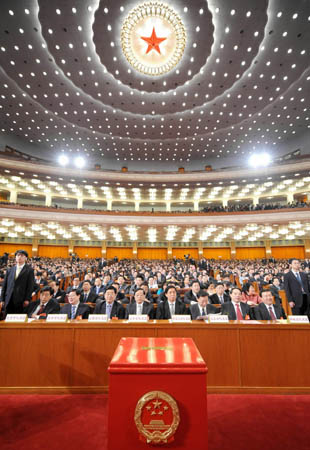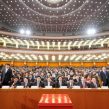
Powerful Interests Stifle Reforms at National People’s Congress
Publication: China Brief Volume: 10 Issue: 6

A major theme of the just-concluded National People’s Congress (NPC) is social and distributive justice, or the ways and means to help disadvantaged sectors such as peasants and migrant workers in China get a fairer share of the fruits of the “Chinese economic miracle.” Premier Wen Jiabao won plaudits from the 2,987 deputies attending the rubberstamp parliament when he pledged to ensure that the “economic pie” would be divvied up “through a rational system of income distribution.” For the first time, the head of the State Council vowed that the administration intends to “let the people live with dignity.” Yet, Wen and his senior ministers failed to deliver on two of the country’s hottest socio-economic concerns: ending the hukou (or residence registration) system; and cooling down the overheated property market. These two shortfalls have exposed the fact that the authorities’ rhetoric about justice and equality aside, powerful monopolies and business groups that seem to enjoy cozy ties with the central and regional leaderships are dead-set against changes that would eat into their vested interests.
Expectations that the Chinese Communist Party (CCP) administration would introduce bold policies to end the much-maligned hukou system—which has prevented more than 800 million rural Chinese from freely settling in cities—were high. Four days before the NPC opened, 13 provincial papers led by Shandong Province’s popular Economic Observer, ran a joint editorial saying that the Maoist-era institution “runs afoul of the spirit of the Constitution” and that the system should be immediately scrapped. “We believe people are born to be free, and people have the right to migrate freely,” said the unprecedented appeal. The editorial asked Beijing to stop putting off the reform, because for the exploited sectors, “every minute of postponement is becoming very prolonged” (Financial Times, March 1; Wall Street Journal, March 10; Ming Pao [Hong Kong], March 2). In his Work Report, however, Wen merely reiterated the familiar plank that the government would “push forward the reform of the residence registration system, and liberalize conditions [for peasants] to establish residence in medium and small cities as well as towns.” The premier also said his government would “in a planned and incremental manner” boost the welfare of the estimated 250 million peasants who have found jobs in the cities, but who are denied permanent residence and access to urban social and educational amenities (Xinhua News Agency, March 5; People’s Daily, March 6).
Moreover, Beijing’s formidable censorship and state-security apparatus effectively put an end to public discussion of the sensitive subject by punishing the editors of the 13 papers. Zhang Hong, deputy editor of the Economic Observer, was fired and others were given warnings. NPC deputies, 70 percent of whom are CCP cadres, largely refrained from addressing the hukou imbroglio during the nine-day annual plenary session. The reason behind the party leadership’s conservative stance is easy to understand. Opposition to the relaxation of the residence permit system comes from cadres of big and medium-sized cities, who have told Beijing that more migrants would wreak havoc on already-overstrained social services. “Many local governments and central agencies worry about reallocation of resources caused by the influx of more ‘newcomers’ to the cities,” said American Sinologist Fei-Ling Wang. “That may not be good for GDP growth, which defines their work-report card.” Other diehard supporters of the hukou system include corrupt police officers and municipal administrators. They are used to collecting huge bribes and “hush money” from migrant laborers who want to stay in the cities illegally (CNN.com, March 12; AFP, March 10; Reuters, March 11).
So far, the only good news on the hukou front consists of relatively vague promises made by cadres in prosperous coastal provinces and cities that qualified migrant workers would gradually be given permanent residence. For example, Huang Huahua, governor of Guangdong, which is one of the most popular destinations for migrant workers, said his province might be able to give PR status to a maximum of 600,000 rural laborers a year. Individual Guangdong cities have started a “point system” to assess who among rural work hands may be granted full-fledged urban hukou. In the mean time, however, migrant workers remain second-class citizens with no prospects for pensions, unemployment insurance and other benefits (Information Times [Beijing], March 11; Financial Times, March 11).
For urban residents, especially the burgeoning middle class whose support is crucial for the continuation of the CCP’s “perennial ruling party” status, the hot-button issue the past two years has undoubtedly been runaway property prices. A recent Chinese Academy of Social Sciences (CASS) survey said 85 percent of families could not afford an apartment. The word “bubble” however, did not appear in Wen’s Work Report. Nor did the premier introduce tough tactics to combat speculation and other root causes of the scourge. Wen merely indicated that Beijing would “ensure the steady and healthy development of the real-estate market.” The State Council has earmarked 64.2 billion yuan ($9.40 billion), a mere 8.1 billion yuan ($1.19 billion) more than that of 2009, toward building 3 million “social security” or low-cost units, as well as renovating 2.8 million units of squatter housing (China Daily, March 6; Wen Wei Po [Hong Kong] March 2).
Wen’s ministers in charge of housing and land also failed to map out concrete steps to take on irrational exuberance in this sector. While talking to NPC deputies, Minister of Housing and Urban-Rural Construction Jiang Weixin said rather helplessly that “my prediction is that the upward pressure on housing prices will remain great for the next 20 years because demand will be huge due to rapid urbanization and industrialization and because our land is limited.” Jiang’s deputy, Vice-Minister Guo Yunchong caused an uproar among legislators when he admitted that his ministry “has very few means to regulate the real-estate market.” “There are hardly any measures at our disposal,” he added. “Land use is under the control of the Ministry of Land and Natural Resources; taxes are up to the taxation authorities; and loans and mortgages are handled by the banks” (Xinhua News Agency, March 9; Beijing Youth Daily Net, March 10).
The Wen administration has also been accused of downplaying the severity of the housing bubble. On the eve of the NPC, the National Bureau of Statistics released a report claiming that property prices had risen by just 1.5 percent through 2009. The “publicized rate of increase is obviously lower than the actual perception of the masses,” commented the official Beijing Morning Post. The relatively liberal paper added that real-estate prices had risen by more than 30 per cent last year. For many regional administrations, the housing sector is the goose that lays the golden egg. For every 1 million yuan apartment that is sold, the government can collect some 300,000 yuan in taxes and other fees (New Beijing Post, February 26; The Telegraph [London], February 28). Land-sale profits are even more considerable. Well-known social critic and professor, Hu Xingdou, estimated that big cities such as Beijing, Shanghai, Hangzhou and Shenzhen had in recent years sold land worth 100 billion yuan ($14.64 billion) annually. Professor Hu, who teaches at the Beijing Polytechnic University, doubted the effectiveness of pledges made by many cities about building more low-cost flats for the masses. “These announcements were timed to placate NPC deputies,” Hu said. Famous Peking University economist Li Yining said apartment prices would not come down as long as regional officials adopt a “myopic” attitude toward increasing their revenues. He said consumer spending—a key pillar for economic growth—could be hard hit because “many families are burdened with heavy mortgage payments for decades and they have no money to spend” (China News Service, March 13; Ming Pao, March 27).
Perhaps even more significant is the fact that the Beijing leadership seems unwilling to tinker with the basic formula based on the economic pie that is being apportioned. For the past two decades, the bulk of national wealth has gone to the central government as well as several dozen state-controlled conglomerates. The income of workers accounts for just 11 percent of GDP, down from 17 percent in the 1980s (Wen Wei Po, March 4; Asiasentinel.com, December 15, 2009). In his Work Report, Wen vowed to speed up the structural reform of yangqi, or “centrally held enterprises,” including curtailing their monopolistic powers. Beijing has also indicated that it will scale down the generous salaries and bonuses enjoyed by the senior management of these government-controlled conglomerates. A number of liberal intellectuals such as CASS sociologist Yu Jianrong and former People’s Daily Deputy Editor Zhou Ruijin have decried how the rise of “power capitalism” or “aristocratic capitalism”—a reference to the collusion between senior cadres and business groups—could tear asunder the country’s fragile social fabric (Chinadigitaltimes.net, February 18; Financial Times [Beijing], December 12, 2009). Yet this potentially explosive issue remains unaddressed during the Congress.
Equally disturbing is the fact that Beijing is beefing up its control apparatus to “snuff out destabilizing agents in the bud.” The NPC approved a 514.01 billion yuan ($75.26 billion) public security budget for 2010, or 8.9 percent over that of last year. By contrast, financial allocations for the People’s Liberation Army (PLA) were set at 532.12 billion yuan ($77.91 billion), a rise of just 7.5 percent over 2009. Funding for buttressing socio-political stability expanded drastically in 2008 and 2009, which witnessed an outbreak of some 100,000 cases of “mass incidents” annually. To underwrite massive recruitment of police, People’s Armed Police (PAP) officers and state-security agents, the Ministry of Public Security (MPS) and other departments incurred an expenditure of 472.07 billion yuan ($69.12 billion) last year, which was 16.3 percent over budget. Moreover, the CCP leadership seems to have institutionalized the “people’s warfare” approach to bolstering public security. Taking the cue from how the Beijing municipality put together a 1 million-strong “security network of the masses”—which includes police, vigilantes and neighborhood committee informants—the MPS mobilized 700,000 officers and volunteers to ensure the capital’s law and order during this NPC. Moreover, a similarly large-scale arrangement is being planned for the World Expo, which opens in Shanghai on May 1 (Ming Pao, March 6; Wen Wei Po, March 3; Apple Daily [Hong Kong], March 11).
At his international press conference held at the end of the NPC last Sunday, Premier Wen said Beijing would “push forward economic and political reform so as to realize social equality and justice.” “Every citizen should be able to enjoy freedom as well as opportunities for full development,” he added. It is certainly a good sign that after being preoccupied for almost three decades with GDP expansion and the augmentation of the country’s comprehensive strength, the CCP leadership has finally turned its attention to social equality and distributive justice. That the Wen cabinet has shied away from tackling deep-seated factors behind China’s socio-economic malaise, however, could not only exacerbate frustrations among disadvantaged classes but also jeopardize the CCP’s much-prized “long reign and perennial stability.”





